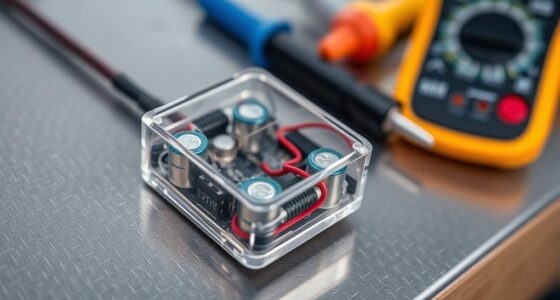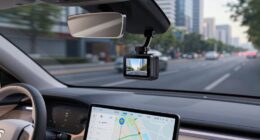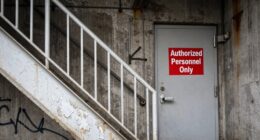Home security systems can pose a risk if not properly maintained or managed. While they are beneficial in protecting your home, false alarms can lead to unnecessary police visits and fines. Failing to address alerts and relying too heavily on technology can increase your vulnerability. Neglecting regular system checks may result in malfunctions. Remember, simple practices such as securing doors and windows are crucial. It’s important to find a balance between feeling secure and being complacent. To ensure maximum safety for your home, there are additional strategies to consider for enhancing your security measures effectively.
Key Takeaways
- Home security systems can lead to false alarms, resulting in unnecessary police responses and potential fines for homeowners.
- Poor maintenance of security systems may cause malfunctions, leaving homes vulnerable to real threats.
- Overreliance on technology can create a false sense of security, leading homeowners to neglect basic safety measures.
- Unauthorized access to security settings increases the risk of hacking and compromised security.
Understanding Home Security Systems
Home security systems are crucial tools that protect your home from burglaries and emergencies, making it essential to understand how they work. A well-designed home security system combines various components like alarm systems and security equipment to create a robust defense against property crime.
These systems often include smart security system features, allowing you to monitor your home remotely and receive alerts in real-time. Furthermore, many systems now integrate with other smart home devices, such as garage door openers, enhancing overall security and convenience.
One of the key benefits of having a security system is its effectiveness as a deterrent for criminals. Studies show that 83% of burglars check for alarms before attempting a break-in, and homes without security systems are 300% more likely to be targeted.
Investing in a home security system not only enhances your safety and security but also offers financial protection. The average burglary costs around $2,661 per victim, making it clear that prevention is more cost-effective than recovery.
Additionally, modern systems go beyond burglary deterrence, often incorporating fire and carbon monoxide monitoring. This extensive protection guarantees you're safeguarding your home from various emergencies, contributing to your overall sense of safety and peace of mind.
Risks and Dangers of Alarms

While alarms can enhance your security, they also come with risks that can undermine their effectiveness if not managed properly. If you become complacent and rely solely on alarms, you might overlook other crucial security measures. Here are some key risks to take into account:
| Risk | Impact |
|---|---|
| False Alarms | Unnecessary police responses and fines |
| Complacency | Increased vulnerability to real threats |
| Poor Maintenance | Malfunctioning security systems |
| Unauthorized Access | Potential hacking if settings aren't changed |
| Psychological Impact | False sense of security |
Many homeowners fail to maintain their security systems, which can lead to false alarms that dilute their effectiveness. Additionally, if your system is poorly installed, you risk unauthorized access, making it easier for intruders to bypass your defenses. The psychological impact of alarms can also mislead you into thinking your home is secure, causing you to neglect thorough safety practices. To truly protect your home, prioritize regular maintenance and remain aware of all potential security threats beyond just alarms.
Common Misconceptions About Security

When it comes to home security, you might think that having a system in place means you're completely protected, but that's not always the case.
Many homeowners overestimate the effectiveness of technology and underestimate the importance of other security measures, such as maintaining mental health for a clear mindset during emergencies.
It's vital to understand these misconceptions to better safeguard your home, especially considering the mental health support critical for those at risk of dementia.
False Sense of Security
Many people mistakenly believe that having a security system alone guarantees safety, but ignoring alerts can leave you vulnerable to break-ins. This false sense of security often leads homeowners to overlook essential safety practices. While security systems can deter burglars, their effectiveness is diminished if you don't use them properly.
Here are some common pitfalls that create a false sense of security:
- Ignoring alarms and alerts, which can invite complacency.
- Turning off alarms at home to avoid accidental triggers.
- Failing to utilize all features of the security system, reducing overall protection.
- Relying solely on technology instead of implementing additional physical deterrents.
Research shows that 60% of homeowners ignore alerts from their security systems, making them more susceptible to break-ins. Remember, just having a security system isn't enough; active engagement with your alarms and additional safety measures are vital.
Overreliance on Technology
Overreliance on technology can lead you to overlook basic security measures, leaving your home vulnerable despite having an alarm system in place. Many homeowners mistakenly believe that their security systems are a catch-all solution, neglecting essential practices like locking doors and windows. This complacency can make your property a target for criminals who adapt to bypass alarm systems they perceive as ineffective.
Additionally, just as proper maintenance is important for guaranteeing the effectiveness of an air purifier, regular checks and updates of your security system are crucial for maximum protection regular maintenance guarantees maximum performance.
While 83% of burglars check for alarms before attempting a break-in, a significant number of homeowners leave their security alarms off while at home to avoid accidental triggers. This misuse reduces the effectiveness of the security systems you've invested in. In fact, studies indicate that 60% of burglars would choose an alternative target if they noticed a security alarm present, emphasizing the significance of proper usage and visibility.
Ultimately, relying solely on technology can create a false sense of security. To truly protect your home from property crimes, you must combine your alarm systems with diligent preventative measures.
Don't let overreliance on technology put your safety at risk—stay proactive and engaged in securing your space.
Misunderstanding Alarm Effectiveness
Believing that a security system alone guarantees safety can leave you vulnerable to break-ins and misunderstandings about how these systems truly function. Many homeowners overlook key aspects of alarm effectiveness that can greatly influence home protection. Understanding the nuances of cybersecurity and ethical hacking can also enhance your approach to home security, as both fields emphasize proactive measures to safeguard against threats.
Here are some common misconceptions:
- Security systems aren't foolproof: 83% of burglars check for alarms before attempting a break-in.
- Homeowners insurance won't cover negligence: Ignoring alert settings can lead to issues during claims.
- Alarm systems need regular monitoring: Turning off your alarm at home opens you up to risks.
- Visible security measures matter: Signs announcing your alarm can deter up to 83% of burglars.
Understanding these points is essential for effective home protection. Security systems are a valuable tool, but they require your active participation to be truly effective. If you rely solely on the technology without proper usage, you might find yourself more at risk than you anticipated.
Always remember, an informed approach to your security alarm can make all the difference in keeping your home safe.
Effectiveness of Security Systems

While home security systems can greatly enhance your safety, they're not foolproof.
Many homeowners forget the importance of regular maintenance and updates, which can leave vulnerabilities exposed.
You might feel secure, but relying solely on these systems can create a false sense of security if you don't fully utilize their features.
Plus, it's important to remember that criminals adapt, so staying informed about potential vulnerabilities is key to maintaining your home's protection.
Consider strategies like community building and networking for survivalists to bolster your overall security approach.
False Sense of Security
Many homeowners often feel overly secure with their alarm systems in place, mistakenly thinking they're fully protected against potential break-ins. This false sense of security can lead to complacency, and while alarm systems provide some deterrent effect, they aren't foolproof.
It's important to recognize that just as strong problem-solving skills are essential for successful SQA engineers in identifying software defects, homeowners should also be proactive in identifying and mitigating security risks. Here are some significant points to reflect on:
- 83% of burglars check for alarms before attempting a break-in, but many still proceed if they find them deactivated.
- 60% of burglars would choose a different target upon noticing an alarm, but that doesn't mean your home is entirely safe.
- Homes without security systems are 300% more likely to be burglarized, revealing the risk of overconfidence among homeowners relying solely on alarms.
- Many homeowners disable their alarms when home to avoid accidental triggers, reducing their system's effectiveness.
Ultimately, while security systems can act as a deterrent, they shouldn't replace vigilant practices. Staying proactive is key to truly safeguarding your home.
Underutilization of Features
Underutilizing features like motion sensors and zoning capabilities can greatly reduce the effectiveness of your security system in deterring crime. Many homeowners overlook these critical elements, leaving their systems less effective than they should be.
When you neglect to activate motion sensors or customize zoning, you miss out on enhanced protection and alerts that could notify you of suspicious activity. Utilizing all available features can considerably improve your home's safety, much like how key factors in choosing a home cleaning service can impact the quality of service you receive.
Alarm companies often provide these advanced features, but if you don't use them, you compromise your security. It's common for homeowners to leave alarms off to avoid false triggers while home, but this habit weakens the overall protective capabilities of your system. Ignoring alerts from your security system can further diminish its intended deterrent effect, as the alerts are designed to prompt quick action.
Statistics show that homes with security systems are still three times more likely to be burglarized if they're not used effectively. By fully utilizing all features of your security system, you can considerably enhance its effectiveness and provide a stronger deterrent against potential intruders.
Don't let underutilization put your safety at risk.
Adaptation by Criminals
Criminals constantly evolve their tactics to exploit the weaknesses of security systems, making it crucial for homeowners to stay vigilant and effectively utilize their defenses.
While security alarms can serve as a strong deterrent effect, many criminals are skilled at adapting their methods to bypass them.
To enhance your home security, consider the following:
- Regularly check and maintain your security systems to verify they're functional.
- Secure all entry points, including doors and windows, to prevent easy access.
- Install motion sensors in strategic locations to cover blind spots.
- Use visible signage indicating the presence of a security alarm, which can deter potential intruders.
Despite the presence of security systems, homes without them are 300% more likely to be burglarized.
By understanding how criminals adapt, you can better prepare and protect your home.
Vulnerabilities in Home Security

Identifying vulnerabilities in home security systems is important, as even the best setups can fall prey to hacking or simple oversights. Many homeowners underestimate the significance of maintaining their locks and alarms, leaving them vulnerable to break-ins. In fact, a considerable percentage of burglaries happen through open or unlatched doors and windows, proving that physical security measures are often neglected.
Moreover, modern security systems can be susceptible to tampering, and many owners mightn't even realize attempts to disable their alarms are happening. This lack of awareness can compromise your safety. It's essential to regularly check your systems for any signs of tampering and to verify your software is up to date to fend off potential hacking threats.
Additionally, consider that dead batteries in smoke alarms contribute to 25% of system failures during fires, highlighting another significant vulnerability. Reinforcing entry points, especially the front door, where 34% of break-ins occur, is critical to enhancing your home's overall security.
Balancing Technology and Vigilance

Striking the right balance between advanced technology and everyday vigilance is essential for guaranteeing your home remains truly secure.
While home security systems, including smart home security systems, can greatly enhance safety, relying solely on them may lead to complacency.
You need to integrate both tech and traditional practices to fortify your home.
Here are some key practices to maintain vigilance alongside your security systems:
- Always lock doors and windows, even if you have smart locks or door sensors.
- Regularly test and maintain your home security systems to verify they're functioning properly.
- Set up professional monitoring to provide an extra layer of security.
- Stay informed about potential privacy issues related to smart technology and take steps to protect your data.
Alternatives to Traditional Security

Exploring alternatives to traditional security systems can provide you with flexible and effective options to enhance your home's safety.
DIY home security systems allow you to set up your own monitoring for a fraction of the cost of professional services, often without the need for long-term contracts. You can easily integrate smart home devices, turning your smartphone into a central hub for security management.
Outdoor cameras and surveillance cameras offer real-time monitoring and can be set up to send instant alerts, giving you peace of mind without breaking the bank. Adding motion detectors and motion-activated lighting can deter potential intruders effectively, acting as a simple yet powerful physical security measure.
Additionally, community watch programs encourage neighbors to look out for one another, enhancing safety through vigilance and communication, rather than relying solely on technology.
Best Practices for Home Safety

To guarantee your home remains a safe haven, prioritize regular maintenance of locks and security features that can effectively deter intruders. Here are some best practices for enhancing your home safety:
- Install smart locks to easily manage access and monitor entries remotely.
- Use security cameras with motion detection to keep an eye on your property and provide evidence if needed.
- Implement sensors to protect doors and windows, ensuring you receive alerts for unauthorized access.
- Engage in community watch programs to foster neighborhood vigilance and deter potential criminals.
Additionally, don't forget to keep your valuables in secure locations away from bedrooms.
Remember, insurance companies often offer discounts for homes with strong security measures, so investing in these systems not only provides peace of mind but can also save you money.
Frequently Asked Questions
Do Burglars Avoid Homes With Security Systems?
Yes, burglars typically avoid homes with security systems. Most check for alarms before attempting a break-in, and many would choose a different target if they detect any security measures in place.
Do Security Systems Actually Make You Safer?
Yes, security systems make you safer. They deter burglars, reduce fire risk, and alert you to hazards. With features like motion sensors and alarms, you gain peace of mind knowing your home is better protected.
Is There a Home Security System That Cannot Be Hacked?
While no security system's truly impervious to hacking, you can find options with robust encryption and two-factor authentication. Regular updates and strong passwords further bolster your defenses, making unauthorized access considerably more difficult.
What Are the Disadvantages of Home Security System?
Home security systems can create a false sense of security, leading you to neglect other safety measures. They may also be underutilized, and technical issues can compromise their effectiveness, leaving your home vulnerable to intruders.
What are the potential dangers of using a home security system?
When it comes to home security systems, there are a few potential dangers to keep in mind. One major concern is the risk of false alarms, as they can lead to complacency or fines. Additionally, hackers can exploit vulnerabilities in the system, compromising the safety of your home.
Conclusion
In the end, while home security systems can enhance your safety, they're not foolproof and can introduce new risks.
For instance, imagine a family relying solely on their alarm system, only to find it malfunctioned during a break-in.
To truly stay safe, combine technology with personal vigilance.
Stay informed, regularly test your systems, and consider alternative security measures.
By doing so, you can create a more secure environment for you and your loved ones.









